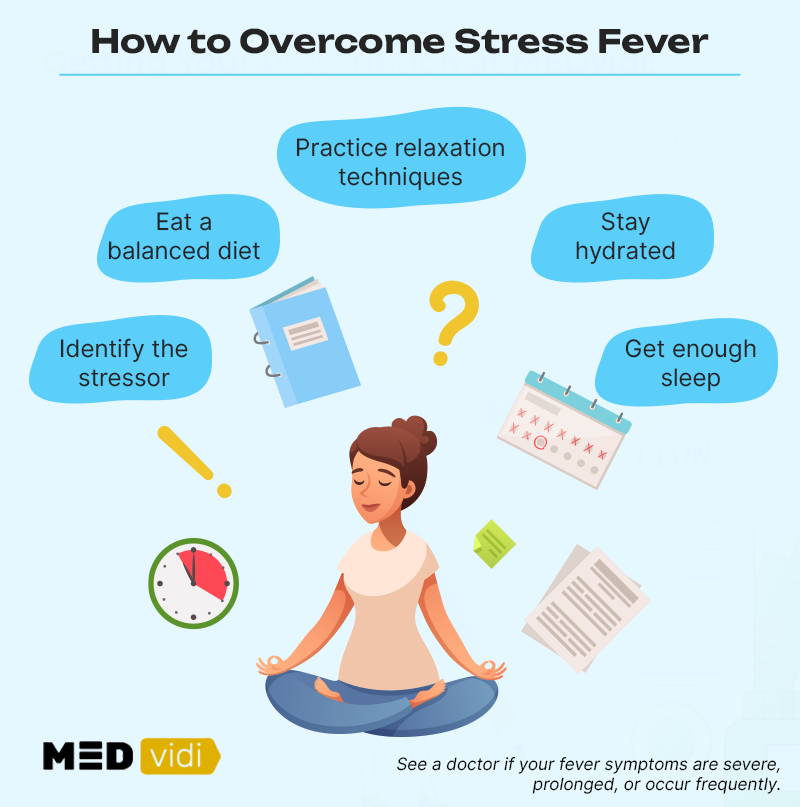Are you feeling stressed out and suddenly notice a spike in your body temperature? It is no secret that stress can wreak havoc on our physical and mental well-being, but can you get a fever from stress?
The idea may seem far-fetched, but recent
What Is Stress Fever?
Stress fever, also known as
Stress Fever Symptoms
Stress fever mostly has general symptoms of a low-grade fever and a range of other symptoms that can be difficult to identify. It is essential to pay attention to the following warning signs:
- High body temperature. The most common symptom of fever from stress is a rise in body temperature, and the magnitude of this increase is different from the magnitude of other types of fever. It may increase above 100.4°F (38°C), and in some cases, it may even reach 105.8°F (41°C).
- Sweating. Another common symptom of stress fever is sweating. The body produces sweat in an attempt to cool down, but excessive sweating can lead to dehydration and other health issues.
- Body chills. Stress fever can trigger body chills as a part of the response to stress usually accompanied by shivering.
- Headaches. Headaches can range from mild to severe and be accompanied by other symptoms such as dizziness, nausea, and sensitivity to light and sound.
- Muscle tension. Stress fever can cause tension in the muscles, especially in the neck, shoulders, and back. This tension can lead to pain and discomfort.
- Fatigue. Prolonged stress can cause fatigue and fever from exhaustion.
- Irritability and anxiety. Stress can also cause emotional symptoms such as irritability, insomnia, anxiety, and depression. These symptoms can worsen stress fever and make it more difficult to manage.
- Digestive issues. Stress can also affect the digestive system, leading to nausea, vomiting, or diarrhea. These symptoms can make stress fever more uncomfortable and challenging to manage.
If the symptoms are severe, it is vital to seek medical attention to prevent serious health issues.
Causes of Stress Fever
While it is not a medical condition in and of itself, stress fever is often a sign that the body is under a significant amount of pressure. The psychological causes of stress fever can be the following:
- Emotional stress
- Environmental stress
- Chronic stress
- Medications
- Underlying physical or mental health issues

How Stress Fever is Diagnosed in Adults
This rare condition can be challenging to diagnose, but there are several approaches that doctors use to identify it.
One way to diagnose stress fever is through
Diagnosing stress fever can be difficult, and doctors may need to conduct further tests or evaluations to rule out other medical conditions or underlying mental health issues. However, with the right approach and collaboration with healthcare providers, patients can receive an accurate diagnosis and develop a treatment plan to manage their symptoms.
Coping With Stress Sickness
Coping with stress fever is a crucial step towards protecting your overall health and well-being. Let’s discuss several strategies that can help you feel your best:
- Identify the source of your stress. Is it work-related stress, relationship stress, or stress from financial worries? Once you identify the cause of your stress, you can begin to take steps to reduce or eliminate it.
- Practice relaxation techniques. Combat stress fever symptoms with relaxation techniques like deep breathing, meditation, and yoga. By focusing on your breath as it enters and leaves your body, you can lower stress levels and promote overall well-being. Incorporate a few minutes of meditation into your daily routine or try practicing stress management yoga to relax your mind and body.
- Get enough sleep. To help your body recover from daily stress, aim for 7-8 hours of restful sleep. Avoid consuming caffeine or alcohol before bedtime and stick to a consistent sleep schedule to control your body’s natural sleep-wake cycle. By prioritizing good sleep hygiene, you can reduce stress and promote better overall health.
- Stay hydrated. Dehydration can be a consequence of stress-induced fever, which is why it’s crucial to maintain proper hydration levels. Opt for water, coconut water, or herbal tea instead of sugary drinks to ensure that your body is replenished with the necessary fluids.
- Eat a balanced diet. Eating a balanced diet rich in fruits, vegetables, and whole grains can help to boost your immune system and support your body’s natural healing processes. Avoid processed foods, sugary snacks, and excessive caffeine and alcohol, which can all contribute to stress and inflammation.
What Are the Medical Treatment Options for Stress Fever?
Clinical treatment options for stress fever address the underlying psychological factor contributing to it. These may include psychotropic medications with anxiolytic and sedative properties and psychotherapy or counseling. They can help manage stress, anxiety, and depression, which are contributing factors. Elimination of the causes can help reduce fever and relieve pain. It is important to note that anti-fever medications are ineffective in reducing stress fever, as it is caused by different mechanisms.
If you are experiencing persistent fever or other signs of stress, seek medical attention from a healthcare professional to avoid serious consequences. With proper help, you can pinpoint the root causes of your symptoms and receive a personalized plan to manage stress and improve your overall well-being.
Bottom Line
If you suspect that you have a stress fever or are experiencing psychogenic fever, seek medical attention from a qualified healthcare provider. By working with your doctor and taking steps to manage your stress, you can effectively cope with stress fever and improve your overall health and well-being.
At MEDvidi, our team of mental health professionals specializes in stress management and can offer expert guidance on treatment strategies. With our support and expertise, you can feel empowered to manage stress and take charge of your mental health.













